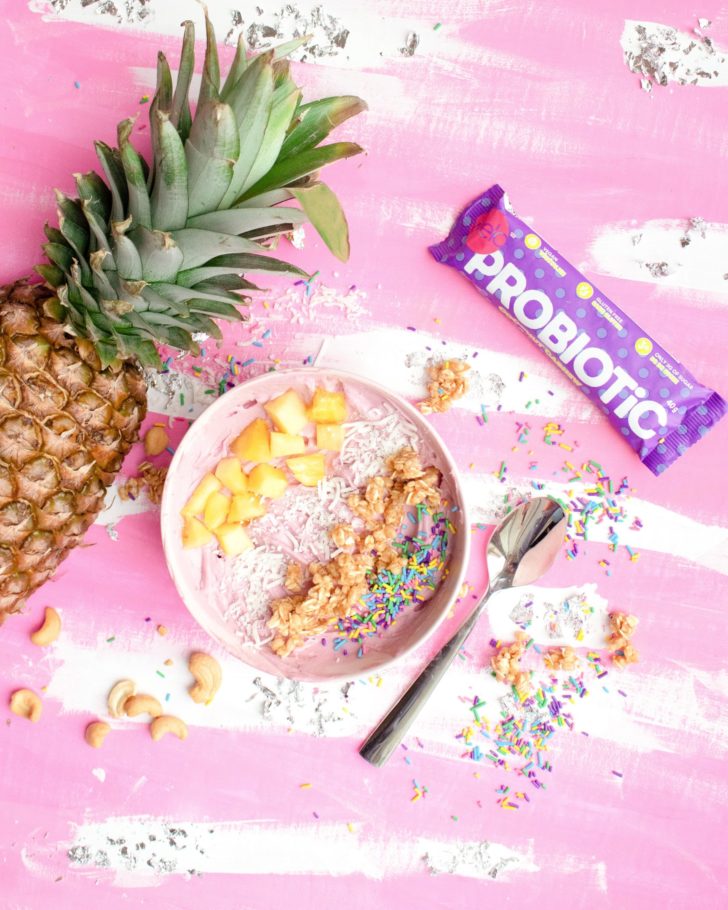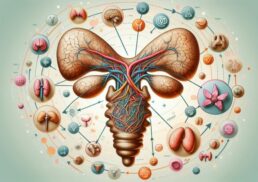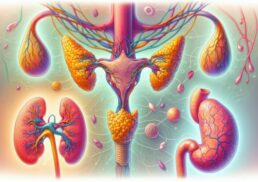Imagine having the power to optimize your overall health and well-being, simply by nurturing the trillions of microscopic residents within your gut. It’s not science fiction – it’s the reality of the incredible world of gut health. The importance of gut health lies in its role in digestion, nutrient absorption, immune function, and mental health, making it crucial for overall well-being. Are you ready to unlock the secrets of optimal gut health and transform your life?
Key Takeaways
Maintaining a healthy gut microbiome is essential for optimum digestion, nutrient absorption, immune function and mental health.
Incorporating probiotic-rich foods into your diet helps to support efficient digestion and nutrient absorption while lifestyle factors such as stress management, exercise and sleep quality are key in maintaining a healthy gut microbiome.
Effective strategies to improve gut health include dietary adjustments like reducing processed food intake or incorporating fermented foods along with mindful eating practices and professional guidance when necessary.
The Importance of Gut Health

A healthy gut is a cornerstone of a healthy body and mind. Our digestive tract is home to trillions of bacteria, including intestinal bacteria, collectively known as the gut microbiome. These tiny inhabitants play a critical role in:
digestion
nutrient absorption
immune function
mental health
Disruption of the delicate balance of beneficial gut bacteria can result in poor gut health, which in turn can lead to various health issues.
Digestion and Nutrient Absorption
A healthy gut ensures efficient digestion and absorption of nutrients, preventing malnutrition and related health issues. To keep your gut in tip-top shape, consider incorporating probiotic-rich foods like sauerkraut into your diet. This pickled cabbage dish is teeming with beneficial bacteria that can provide a much-needed boost to your digestive system.
Not only do these tiny powerhouses aid in digestion, but they also help your body absorb the nutrients it needs to thrive. Nourishing your gut with probiotics and prebiotics paves the way for a healthier and happier you.
Immune Function
Did you know that a significant portion of your immune system resides in your gut? That’s right – a balanced gut microbiome is essential for optimal immune function. Maintaining a healthy gut safeguards your body from harmful substances, microbes, and cellular changes that could potentially lead to sickness.
An unhealthy gut, on the other hand, may contribute to systemic inflammation and disruption of the immune system, potentially increasing the risk of autoimmune diseases. So, the next time you reach for that probiotic-rich yogurt, remember that you’re not only supporting your gut health but also bolstering your immune system.
Mental Health
The gut-brain connection is a fascinating aspect of human health, highlighting the impact of gut health on mental well-being. Research suggests that imbalances in the gut microbiome may lead to anxiety, depression, and other mental health issues.
Prioritizing gut health through dietary and lifestyle choices also provides gut health benefits, including improved mental well-being. Indeed, a healthy gut can contribute to a happier, more resilient mind.
Probiotics and Prebiotics: The Dynamic Duo

Meet probiotics and prebiotics, the dynamic duo that works together to maintain a healthy gut microbiome. Probiotics are live microorganisms found in fermented foods, such as yogurt and kimchi, which introduce beneficial bacteria into the digestive system. Probiotic supplements are another way to introduce these helpful microorganisms into your diet.
Prebiotics, on the other hand, are types of dietary fiber that nourish these probiotics, ensuring they can thrive and maintain a balanced gut microbiome.
Probiotic Powerhouses
Including probiotic foods in your diet can help improve gut health by introducing beneficial bacteria to the digestive system. Some excellent sources of probiotic foods include:
Kimchi
Kefir
Tempeh
Kombucha
Sauerkraut
Cottage cheese
Yogurt with live cultures
Adding these foods to your diet can have a positive impact on your gut health.
It’s vital to choose probiotic-rich foods from brands that contain live active cultures. Adding these powerhouses to your diet can be a game-changer in supporting a healthy, balanced gut microbiome.
Prebiotic Boosters
Incorporating prebiotic-rich foods into your diet is key to keeping your gut’s healthy bacteria well-fed and thriving, as these foods support the growth of beneficial bacteria. Artichokes, garlic, and oats are excellent examples of prebiotic boosters that provide the necessary nutrients for probiotics to flourish.
Garlic, for instance, not only nourishes the beneficial bacteria in your gut but also exhibits antibacterial and antiviral properties that bolster the immune system. Oats, on the other hand, offer a balanced combination of complex carbohydrates, plant-based protein, and fiber, making them an excellent prebiotic food to improve gut health.
Lifestyle Factors Affecting Gut Health
While diet plays a significant role in gut health, it’s important not to overlook the impact of lifestyle factors. Maintaining a healthy gut microbiome is significantly influenced by stress management, exercise, and sleep quality.
These lifestyle factors can help to reduce inflammation, improve digestion, and support the growth of beneficial bacteria in the gut, all of which contribute to the health benefits of maintaining a balanced lifestyle.
Stress Management
Chronic stress can wreak havoc on your gut microbiome, potentially leading to digestive issues, inflammation, and other health problems. To keep stress at bay and support a healthy gut, it’s essential to practice stress management techniques, such as engaging in regular physical activity, practicing mindfulness and relaxation exercises, and seeking professional assistance when necessary.
Managing stress levels not only improves your gut health but also promotes overall well-being.
Learn more, visit Stress Affecting Your Gut? These 4 Tips Can Help.
Exercise and Physical Activity
Regular exercise and physical activity are essential for promoting a diverse and healthy gut microbiome. Engaging in regular physical activity can reduce inflammation, improve digestion, and support the growth of beneficial bacteria in the gut.
To maximize the benefits of exercise for gut health, aim for at least 30 minutes of moderate-intensity physical activity daily, and incorporate a variety of activities such as:
walking
running
swimming
strength training
Sleep Quality
Ensuring adequate sleep quality is essential for gut health, as poor sleep can disrupt the gut microbiome and lead to various health issues. To prioritize sleep quality, set up a regular sleep schedule, make your sleeping area comfortable, and engage in relaxation techniques before sleep.
Focusing on sleep quality supports your gut health and promotes overall well-being.
Warning Signs of Poor Gut Health

Recognizing the warning signs of poor gut health, such as irritable bowel syndrome, is crucial for timely intervention and restoration of gut balance. Common indicators include:
Upset stomach
Unintentional weight changes
Sleep disturbances
Skin irritation
Food intolerances
Research suggests that there may be a link between food allergies and gut health, further emphasizing the importance of maintaining a healthy gut microbiome. In addition, excessive alcohol consumption can negatively impact gut health, leading to intestinal inflammation and changes in the microbiota.
Addressing these warning signs allows you to take proactive steps towards improving your gut health and overall well-being.
Effective Strategies to Improve Gut Health
Improving digestive health doesn’t have to be a daunting task. With effective strategies such as dietary adjustments, mindful eating practices, and considering supplements or professional guidance when necessary, you can tailor your gut health improvement plan to your individual needs and ensure optimal results.
Dietary Adjustments
One of the most effective ways to improve gut health is by making dietary adjustments. Here are some tips:
Reduce processed foods
Increase fiber intake
Incorporate fermented foods into your diet
Focus on incorporating more fruits, vegetables, whole grains, and lean proteins into your diet to nourish your gut microbiome with the nutrients it needs to thrive.
In addition to these changes, consider including mushrooms, collagen-rich foods like bone broth and salmon skin, and antioxidant-packed dragon fruit in your diet for an extra gut health boost.
Mindful Eating Practices
Practicing mindful eating can help maintain a healthy gut by reducing digestive discomfort and promoting nutrient absorption. To practice mindful eating, take a few deep breaths before beginning your meal, chew your food slowly, and be mindful of the flavors and textures. Noticing how your body feels as you eat and stopping when you feel full can also contribute to improved gut health.
Incorporating mindful eating practices into your daily routine supports your gut health and fosters a healthier relationship with food.
Supplements and Professional Guidance
In some cases, considering supplements such as probiotics or prebiotics can help improve gut health. However, it’s essential to consult a healthcare professional before taking any supplements or making significant dietary changes to ensure the best possible outcomes.
Seeking professional guidance can help you develop a tailored gut health improvement plan that addresses your individual needs and optimizes your results.
Summary
In conclusion, nurturing your gut health is a powerful way to optimize your overall well-being. By understanding the importance of gut health, incorporating probiotics and prebiotics, making lifestyle adjustments, and recognizing the warning signs of poor gut health, you can unlock the full potential of your gut microbiome. Remember, a healthy gut is the foundation for a healthy body and mind.
So, are you ready to embark on this transformative journey towards optimal gut health? The power to change lies within you – and your gut.
Frequently Asked Questions
How can I improve my gut health?
To improve your gut health, start with small diet changes like eating a plant-based diet with fiber from fruits and vegetables, getting enough sleep, managing stress levels, and including fermented foods in your meals. Additionally, drinking plenty of water and limiting ultra-processed foods can also help support a healthy gut.
What are the signs of an unhealthy gut?
Signs of an unhealthy gut include upset stomach, fatigue, insomnia, food intolerances, cravings, weight gain/loss, and skin irritations.
How do I reset my gut?
Reset your gut by consuming a whole-foods, plant-based diet full of fiber and essential nutrients, eating fermented foods, taking probiotic supplements, staying hydrated, exercising regularly, and managing stress.
What are the main functions of the gut microbiome?
The gut microbiome is essential for digestion, nutrient absorption, immune system support, and mental wellbeing.
How can I increase my intake of probiotic-rich foods?
Incorporate fermented foods such as yogurt, kefir, kimchi, and sauerkraut into your diet to increase your intake of probiotic-rich foods.









